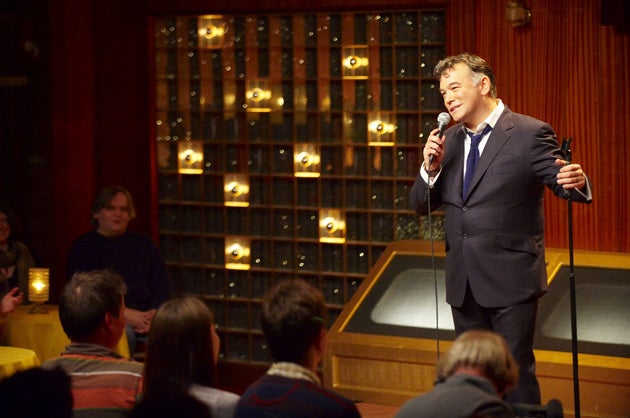Last Night's Television - Keep taking the mic
Stewart Lee's Comedy Vehicle, BBC2; <br /> Grow Your Own Drugs, BBC2; <br />In Search of Wabi Sabi, BBC4

Like history, and the kipper, comedy tends to repeat on you. For example, Stewart Lee's Comedy Vehicle amounts to very little more than Lee doing his stand-up comedy act in front of an audience but with a camera pointing at him, and Dave Allen at Large, of blessed memory, amounted to the same thing. But in Lee's case, as in Allen's, a smattering of sketches constitutes the "very little more", perhaps because it was considered a cop-out just to record him doing his thing on stage, or perhaps to perk up the rhythm of the show. Either way, the sketches in Stewart Lee's Comedy Vehicle are hit and miss, just as they were when Allen dressed up as the Pope. Someone, maybe Lee himself, should have had the confidence to rely entirely on his stand-up act, which is wonderful, and well worth the attention of a wider audience. The sketches add nothing.
Last night, the principal object of his derisive but inventive strain of humour were "celebrity hardbacks", books that sell by the truckload just because they have a famous person's name on the jacket. For those of us who write books but aren't famous, and see our meisterworks relegated in ones and twos to the back of the shop while Paris Hilton's autobiography is piled high at the entrance, this is a topic eminently worthy of ridicule. In my front room, Lee was preaching not so much to the converted, as to an ayatollah.
He did so brilliantly, though. And what I love about his act is that he does not feel remotely bound by the conventions of showbiz brotherhood. Thus, Russell Brand, Jeremy Clarkson and Chris Moyles all got it squarely in the neck, as did Dan Brown, the author of the execrably written The Da Vinci Code and lines such as "the famous man looked at the red cup". As for Brand's My Booky Wook, Lee's feeling is that you can either read it and dismiss it as rubbish, or dismiss it as rubbish first, to save yourself the trouble. And the danger of buying too many of Clarkson's books, he added, is that you find yourself profiled on Amazon as the sort of person who might also enjoy Mein Kampf.
It was for the Radio 1 DJ Moyles, however, that he saved most of his venom. The sequel to The Gospel According to Chris Moyles is The Difficult Second Book, a title with "a degree of irony and self-awareness largely absent from the text". Moyles, he told us, writes that he would like it to be seen as a great toilet book. "Ah, the vaulting ambition of the writer," murmured Lee, pointing out that a quote on the book's cover by Davina McCall describes it as "butt-clenchingly honest". And if a book induces butt-clenching in a reader, how can it also be a great toilet book? It takes a forensic comic mind to raise that conundrum.
Lee won't thank me for comparing him to the late Bernard Manning, but what he does have in common with Manning is the utter self-assurance that comes from the conviction that the audience is on his wavelength. Rightly or wrongly, he assumes us to be as literate and liberal as he is, hence last night's marvellous riff on the idea that the last person said to have read all the books published in his lifetime was the 18th-century polymath Thomas Young, but if there were someone around today who had done likewise, they would end up more stupid than a person who had read nothing.
If Lee had watched Grow Your Own Drugs, he would be even more appalled at the destruction of trees to turn into copies of The Gospel According to Chris Moyles. For trees, as nice young James Wong explained, can improve our circulation and even boost our memories.
Unlikely though I would be to put conkers in a blender with a mugful of vodka even if I had varicose veins, I like this series. It is intended pragmatically, but like most cookery and home-makeover programmes it is largely aspirational. It's great to watch Wong turning pine resin into a deodorant, lovely to know it can be done, but we'll doubtless all carry on buying Lynx. And even if some folk do try to follow his recipes,telling us that ingesting the boiled leaves of the Japanese ginkgo tree is likely to help the habitually forgetful can have only one outcome: dozens of people standing in health-food shops saying to the sales assistant, "it begins with G, I think".
Japan loomed even larger in In Search of Wabi Sabi, a documentary in which Marcel Theroux, brother of Louis, tried to discover more about a Japanese philosophy called, you've guessed, wabi sabi. Marcel has Louis's studied air of haplessness, which is fine in smallish doses, but this was a dose capable of killing a cow: almost 90 minutes. I stuck with his quest for the meaning of wabi sabi for as long as I could without being tempted to commit hara-kiri.
Join our commenting forum
Join thought-provoking conversations, follow other Independent readers and see their replies
Comments
Bookmark popover
Removed from bookmarks